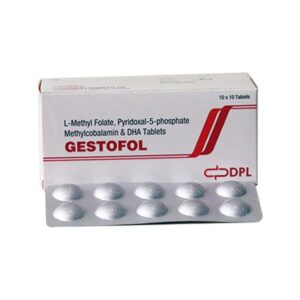L-METHYLFOLATE + PYRIDOXAL-5-PHOSPATE
L-Methylfolate: L-Methylfolate is the active form of folic acid, a B-vitamin that is essential for the production of red blood cells and the synthesis and repair of DNA. It is commonly used as a dietary supplement or as a prescription medication to treat certain conditions.
One of the primary uses of L-Methylfolate is in the treatment of depression. It is believed that L-Methylfolate helps to enhance the production of neurotransmitters such as serotonin, dopamine, and norepinephrine, which are important for mood regulation. By increasing the availability of these neurotransmitters, L-Methylfolate can help improve the symptoms of depression.
In addition to depression, L-Methylfolate is also used in the treatment of certain neurological disorders such as schizophrenia and bipolar disorder. It is often prescribed as an adjunct therapy to be used in combination with other medications.
The recommended dose of L-Methylfolate can vary depending on the individual’s specific condition and needs. It is typically prescribed in strengths ranging from 7.5 mg to 15 mg. It is important to follow the dosage instructions provided by a healthcare professional or as indicated on the product label.
Like any medication, L-Methylfolate can cause side effects. Common side effects may include headache, nausea, diarrhea, insomnia, irritability, and allergic reactions. If any severe or persistent side effects occur, it is important to seek immediate medical attention.
It is also worth noting that L-Methylfolate may interact with certain medications, including anticonvulsants, methotrexate, and certain antidepressants. Therefore, it is important to inform your healthcare provider about all the medications you are taking before starting L-Methylfolate.
Overall, L-Methylfolate is a medication that is primarily used to treat depression and certain neurological disorders. It works by enhancing the production of neurotransmitters involved in mood regulation. It is important to follow the prescribed dosage and be aware of potential side effects and drug interactions.
Pyridoxal-5-Phospate: Pyridoxal-5-Phosphate, also known as P5P, is the active form of vitamin B6. It is a water-soluble vitamin that plays a vital role in various physiological processes in the body. P5P is used as a nutritional supplement to treat or prevent vitamin B6 deficiency.
The main mechanism of action of P5P involves its conversion into the coenzyme pyridoxal phosphate (PLP). PLP is involved in over 100 enzymatic reactions in the body, including the metabolism of proteins, carbohydrates, and fats. It is essential for the synthesis of neurotransmitters like serotonin, dopamine, and gamma-aminobutyric acid (GABA). P5P also plays a role in the regulation of gene expression and immune function.
The dose of P5P varies depending on the individual’s age, sex, and specific health condition. It is typically available in supplemental forms such as capsules or tablets. The recommended daily dose for adults is generally between 10-50 mg, but it is important to follow the dosage instructions provided by the manufacturer or healthcare professional.
While P5P is generally considered safe, there are potential side effects associated with its use. These side effects are rare and usually mild, including gastrointestinal upset (such as nausea, vomiting, or diarrhea). In some cases, allergic reactions such as itching, rash, or swelling may occur. It is important to consult with a healthcare professional before starting P5P supplementation, especially if you have any underlying medical conditions or are taking other medications.
In summary, Pyridoxal-5-Phosphate is the active form of vitamin B6 and is used to treat or prevent vitamin B6 deficiency. It functions as a coenzyme in various physiological processes in the body, including the metabolism of proteins, carbohydrates, and fats. The dose and potential side effects of P5P should be considered under the guidance of a healthcare professional.

